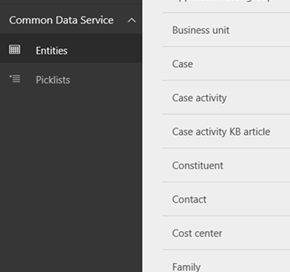Common Data Service reaches general availability with entity updates, PowerApps guidance
 The first release of the Common Data Service (formerly known
as the common data model) is now generally available. It was announced
in conjunction with the general availability of Microsoft Flow, PowerApps, and
Dynamics 365.
The first release of the Common Data Service (formerly known
as the common data model) is now generally available. It was announced
in conjunction with the general availability of Microsoft Flow, PowerApps, and
Dynamics 365.
The standard entities in the Common Data Service (CDS) have now been set, which means developers of business apps now have a starting point from which to plan and create custom entities. Microsoft released preview in August.
Microsoft senior program manager Clay Wesener advises that developers stick to the standard entities whenever possible:
"It's important for app makers to always use standard entities where possible to ensure apps from Microsoft, ISVs and other developers can all work against a common set of data. Leveraging the standard entities also means you benefit from language translations, predefined sample data, security permission sets and improvements released by Microsoft. The standard entities also include relationships to each other to support common business processes. Standard entities can always be extended with custom fields to support additional business data or support additional relationships."
Microsoft categorizes the standard entities into five functional groups: Foundation; People, organizations, and groups; Purchase, Sales, and Customer Service. The top five entities used so far are Contact, Account, Organization, Case and Worker, according to Arif Kureshy, director of program management
Standard entities have been enriched with translations, field groups, and security permissions ...
FREE Membership Required to View Full Content:
Joining MSDynamicsWorld.com gives you free, unlimited access to news, analysis, white papers, case studies, product brochures, and more. You can also receive periodic email newsletters with the latest relevant articles and content updates.
Learn more about us here